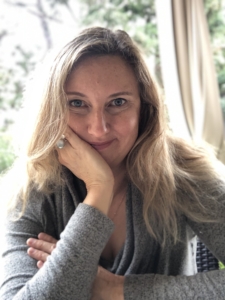Belonging Again
 Goggles in hand, water smacked against the boulder on which I stood. A drumbeat reminder of why I was standing at the edge of Lake Tahoe—to swim. One mile, maybe more. I used to be the type of person who would plunge right in. Instead, I kept my arms folded across my chest wondering what had become of me. I didn’t recognize myself anymore. Not since my brain tumor surgery one year earlier that caused long-term facial palsy. My right eye couldn’t close, and my smile was gone—an em dash leading to nothing. The skin on that side of my face drooped off my jawbone. And yet, underneath that flaccid layer of skin, my cheek and chin muscles were stony, unresponsive. I’d left my body that day and hadn’t returned, becoming as frozen in time as my paralyzed face.
Goggles in hand, water smacked against the boulder on which I stood. A drumbeat reminder of why I was standing at the edge of Lake Tahoe—to swim. One mile, maybe more. I used to be the type of person who would plunge right in. Instead, I kept my arms folded across my chest wondering what had become of me. I didn’t recognize myself anymore. Not since my brain tumor surgery one year earlier that caused long-term facial palsy. My right eye couldn’t close, and my smile was gone—an em dash leading to nothing. The skin on that side of my face drooped off my jawbone. And yet, underneath that flaccid layer of skin, my cheek and chin muscles were stony, unresponsive. I’d left my body that day and hadn’t returned, becoming as frozen in time as my paralyzed face.
My three children were the only reason I was going for a swim—my first real swim since the surgery. They needed to see me living life again. They thought I was “broken.” They’d said as much on the drive up there.
My three children were the only reason I was going for a swim—my first real swim since the surgery. They needed to see me living life again. They thought I was “broken.” They’d said as much on the drive up there.
For the long car ride, I’d chosen the audiobook, I Am Malala based on a top-ten list. When I told my children that it was about an advocate for girls’ education in Pakistan, they groaned in unison, complaining that it sounded like a school-required book. Malala’s prologue launched right into the moment a member of the Taliban put a bullet in her head. My children were riveted.
Somewhere after our ears had popped from gaining elevation on California’s Interstate-80, when we’d left behind suburban sprawl for pine trees and crisp air, the story eventually returned to the shooting scene. When I heard Malala’s voice tell us that the bullet had sliced her facial nerves, I sat up tall in the driver’s seat.
“She ended up with facial palsy! Just like you!” my eight-year-old daughter, Ellie, exclaimed.
I mumbled something back, imagining Malala in that bus, still processing Ellie’s comparison of Malala to me.
“Well, you didn’t have a bullet in you I guess,” she added.
“A pretty big difference,” I managed to say. My hand instinctively went to my face. Until Malala, I hadn’t heard anyone else recount struggles with facial palsy. I’d always felt so alone. Like I no longer belonged anywhere, not even to myself.
Malala then explained that one of her surgeries attempted to repair her facial palsy.
“Can you get that surgery?” Ellie asked.
Her brothers repeated her question. “Yeah, would that fix you?”
“Fix me?” I squeaked in protest.
Finn, my thirteen year old, spoke with such excitement that I could see his curls shaking in the rear-view mirror. “Yeah, then you could maybe smile again. I bet it could fix your—”
“What’s with the ‘fixing’ comments?” I tried to sound playful, but my voice cracked.
Finn poked my arm. “Well, it’s just that your face—”
“Kids!” I said, whipping my head over my shoulder to change lanes. “I am not broken!” I swerved the car onto a freeway exit.
After we arrived at my parents’ cabin, the kids ran to the back deck where the lake shimmered with its claim-to-fame shades of blue. I retreated to my room to find out more about Malala.
“Why’re we getting off?” Finn asked.
“I just need to . . . rest for a few minutes.” I jammed the car into park and plonked my forehead down on the steering wheel. I’d been trying, day after day, to ignore my facial palsy hoping it would resolve. Convinced my face needed to be symmetrical again before seeing the world through a thriving lens. I really was broken.
After we arrived at my parents’ cabin, the kids ran to the back deck where the lake shimmered with its claim-to-fame shades of blue. I retreated to my room to find out more about Malala. I tried to be patient as the slow Wi-Fi unveiled photos of her. My fingers traced her face on my screen and then my face. Even though Malala was a heroine from Pakistan, and I was a 46-year-old mom thousands of miles away, I found someone who looked like me. I hadn’t known how much I needed to see a kindred face.
I don’t know how much time passed. I just remember Ellie plopping down in my lap. She was already rosy-cheeked with sand-speckled feet.
“Is that her?” Ellie asked. “I wanna see her, Mommy.”
I held my breath while we watched Malala giving an interview not long after the shooting. One of her eyes remained wide open in stark contrast to her other one that blinked normally. She only spoke out of one side of her mouth, occasionally giving a lopsided smile. A smirk, at best. I buried my face in the back of Ellie’s hair thinking about when Ellie used to try to mold my cheek back into place as if it were clay, nudging the side of my lip upwards into a forced smile. I waited for her to make some sort of comment about how bad Malala looked. Instead, Ellie trained her big almond eyes on mine and said, “She’s so awesome!” Then, she darted out of the room. A tingling sensation came over me, a thawing of sorts.
That week, I became obsessive, returning to videos of Malala again and again, stalking her, magnifying her face pixel by pixel. If a young girl could survive a bullet and facial palsy, and then go on to become a world leader in education, the least my pathetic-self could do would be to break out of its icy shell. If not for me, then for my children.
That’s what made me decide to return to one of the few places I’d always belonged—the water.
So, there I stood on that boulder at the lake’s edge trying to will myself into swimming, a hobby I’d had such a passion for before my brain tumor. The blinding glare of the alpine sun forced me to hold a hand over my eye, the one that couldn’t blink. Just like Malala’s. My children were somewhere behind me, egging me on.
Lake Tahoe is a cold place to swim. In the summer, the water temperature is in the low sixties. Just a foot below the surface, it drops another ten degrees. I stepped off the boulder into inches of the chilly water. My legs studded with goosebumps. I wanted to return to the cabin to read, preferably under the isolation of a blanket fort.
“C’mon, mom. Jump in!” Finn yelled.
I waded out to just beyond knee level, wincing at the cold snaking up my legs.
I’d been waiting too, but for what? For life to flourish on its own? I pressed my goggles into my eye sockets, barely flinching when I snapped the strap behind my head. I inhaled deeply. Letting out a primal scream, I finally launched into a shallow dive.
“We’re waiting,” sang Ellie.
I’d been waiting too, but for what? For life to flourish on its own? I pressed my goggles into my eye sockets, barely flinching when I snapped the strap behind my head. I inhaled deeply. Letting out a primal scream, I finally launched into a shallow dive. The frigid water filled my ears and hit my chest, knocking my breath from me. I was suddenly gasping for air. The muscles in my back constricted. My body roared to life as my survival instinct burst forth.
My breaths came sharply at first and my eyes darted back and forth in my goggles. Every sense was on overdrive. The skin on my exposed legs and arms burned from the cold, making my limbs flail. I couldn’t find a rhythm with my stroke or kick. Sensation drained away making the water slip between numb fingers. Feel the water. Find your grip.
Minutes passed as I fought for the peace and weightlessness swimming had always offered me before. But it wasn’t coming. Frustrated, I eventually decided to turn around. I must have been in the water fifteen minutes by then. I made one sloppy flip turn in the water, pushing my feet off of nothing. It was then that my transformation took place.
I craned my neck to look just above the surface and spied my children on the distant beach. Returning my gaze to the depths below, I began kicking a count of one-two-three-four and soon settled into my pace, that familiar beat I knew so well. Heat began radiating from my core reconnecting me to my shoulders, my elbows, my hands. My long and powerful legs. My mind and body synced with each other for the first time in months. There I am, I thought. All I had out there was the rhythm of my stroke, the tinkling and crackling of the water, and the sound of my breath. And me.
Each moment was completely and beautifully my own. A spontaneous laugh came out of my mouth, pushing bubbles up and around my face. I’d entered the water for my kids, but I was swimming a path back to belonging in my skin once more.
When the lake became shallow enough to stand up, I rose up tall, letting my chest expand with deep and full breaths. A palsied smile broke free on my face; I didn’t care what it looked like. I angled my face towards the sun, letting the star’s warmth continue to thaw me, inside and out. Finally, I jogged out of the water towards my children feeling so fabulously alive.
KT Ryan writes about motherhood, divorce, and facial palsy when she’s not busy trying to up her pickleball game. Her essays have been featured in Newsweek, The Sun, and Chicken Soup for the Soul. She is a founding member of the Pacific Coast Writers Collective. Before writing creative nonfiction, KT wrote research reports and testimony for the U.S. Congress. She can be followed on Twitter at @KTRyanAuthor.





